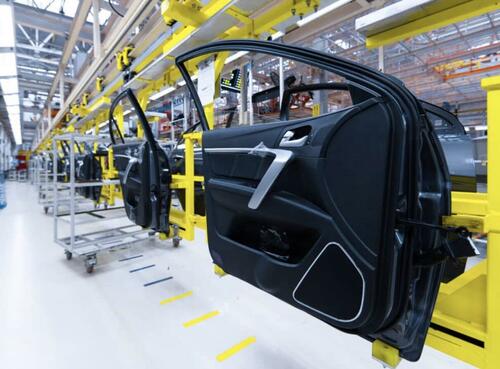According to Deutsche Bank, with U.S. auto tariffs increasingly looking like a permanent fixture, they’re closely monitoring how automakers are responding each week—particularly on pricing, incentives, and production shifts, according to a note out this week by analyst Edison Yu.
While the administration has hinted at potential relief, there’s still no clarity on what that might entail. For now, Deutsche Bank assumes a 25% tariff applies to all imported vehicles, except those qualifying under USCMA rules until customs can fully assess non-U.S. content. Imported parts are expected to fall under the tariff starting May 3rd.
Responses among automakers remain mixed. Ford plans to hike prices on new vehicles next month, Tesla is reportedly halting Chinese parts imports for its CyberCab and Semi programs, and layoffs are anticipated at Volvo truck plants.
Last week we noted that Deutsche Bank said automakers (OEMs) are adopting a wide range of strategies to navigate the uncertainty—adjusting pricing, incentives, and production plans on a rolling basis.
The bank emphasized that the market should operate under the assumption that “all imported vehicles are currently subject to the 25% tariff,” with imported parts facing similar duties starting May 3.
In its April 15 update, Deutsche Bank observed, “Across OEMs, we continue to see a dispersion of reactions.”
For instance, Tesla has paused sales of U.S.-built Model X and S vehicles in China, while GM halted operations at its CAMI Assembly Plant. Mazda, Mitsubishi, and Subaru have also taken a variety of measures—ranging from absorbing price increases to stopping U.S. inventory shipments altogether.
Among notable strategic shifts, Ford is offering broad employee pricing discounts and reshuffling production to its Fort Wayne facility and Honda has publicly stated it will not raise consumer prices as it evaluates its response.
Meanwhile, Infiniti has indefinitely paused production of two crossover models built in Mexico and Rivian and several other EV manufacturers have so far maintained operations but are assessing longer-term impacts.
While some OEMs are absorbing tariff costs temporarily—Mazda, for instance, will do so through April—others are preparing to pass the cost downstream. Deutsche Bank notes that despite a lack of sweeping public announcements, “the cost impact will not be trivial,” as one unnamed CEO warned.
Deutsche Bank continues to track weekly developments and offers updated data in spreadsheet form upon request, cautioning investors that policy developments could shift “overnight.”
We noted earlier this month Deutsche was still cautious on auto stocks. In a note on Monday it said that as Q1 2025 earnings approach, automakers still face significant uncertainty from new tariffs. They expect strong early-year demand as consumers buy ahead of price hikes, followed by a slowdown in the second half as tariffs bite—pushing 2025 U.S. auto sales to 15.4 million, down from 16.0 million in 2024.
Ford and GM could see gross costs rise by over $10 billion, while Tesla and Rivian face smaller impacts due to their supply chains, the note said. These estimates assume a 25% tariff on imported vehicles and parts starting May 3, with exemptions for USMCA-compliant content.
Loading…


















